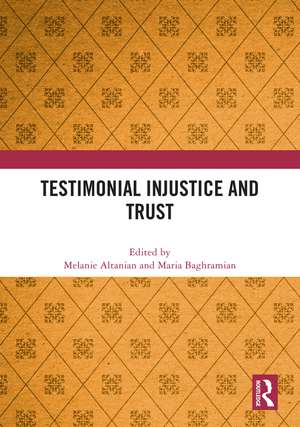Testimonial Injustice and Trust
Editat de Melanie Altanian, Maria Baghramianen Limba Engleză Hardback – 28 noi 2023
Drawing from different philosophical schools of thought and approaches, the book provides a comprehensive analysis of the conditions, mechanisms and normative implications of testimonial injustice, a term most prominently introduced by Fricker (2007), and the role that trust can play in fostering testimonial justice. Through the application of theories of epistemic injustice, and testimonial injustice, to new contexts and cases, including gendered violence, disability, indigenous knowledge, genocide, vaccine hesitancy and the COVID-19 pandemic, the book sheds light on the real-world significance of these philosophical concepts.
Testimonial Injustice and Trust introduces new directions for further research and will appeal to scholars and students in (critical) social and political epistemology, normative ethics as well as social and political philosophy more generally. The chapters in this book were originally published in the International Journal of Philosophical Studies, Social Epistemology and Educational Philosophy and Theory.
Preț: 1011.96 lei
Preț vechi: 1234.10 lei
-18% Nou
Puncte Express: 1518
Preț estimativ în valută:
193.63€ • 202.72$ • 160.22£
193.63€ • 202.72$ • 160.22£
Carte tipărită la comandă
Livrare economică 07-21 aprilie
Preluare comenzi: 021 569.72.76
Specificații
ISBN-13: 9781032500690
ISBN-10: 1032500697
Pagini: 368
Dimensiuni: 174 x 246 x 22 mm
Greutate: 0.79 kg
Ediția:1
Editura: Taylor & Francis
Colecția Routledge
Locul publicării:Oxford, United Kingdom
ISBN-10: 1032500697
Pagini: 368
Dimensiuni: 174 x 246 x 22 mm
Greutate: 0.79 kg
Ediția:1
Editura: Taylor & Francis
Colecția Routledge
Locul publicării:Oxford, United Kingdom
Public țintă
Postgraduate, Undergraduate Advanced, and Undergraduate CoreCuprins
Introduction: Themes from Testimonial Injustice and Trust Part I. Rethinking Testimonial Injustice 1. Can the Demands of Justice Always Be Reconciled with the Demands of Epistemology? Testimonial Injustice and the Prospects of a Normative Clash 2. Silencing by Not Telling: Testimonial Void as a New Kind of Testimonial Injustice. 3. Testifying Bodies: Testimonial Injustice as Derivatization 4. Redefining the Wrong of Epistemic Injustice: The Knower as a Concrete Other and the Affective Dimension of Cognition 5. Bystander Omissions and Accountability for Testimonial Injustice 6. Just How Testimonial, Epistemic, Or Correctable Is Testimonial Injustice? Part II. Testimonial Injustice and the Question of Trust 7. Epistemic Injustice and Epistemic Trust 8. Trust, Distrust, and Testimonial Injustice 9. Social Media, Trust and the Epistemology of Prejudice Part III. The Public Spheres of Testimonial Injustice 10. Articulating Understanding: A Phenomenological Approach to Testimony on Gendered Violence 11. Representation and Epistemic Violence 12. Remembrance and Denial of Genocide: On the Interrelations of Testimonial and Hermeneutical Injustice 13. “The Local Consultant Will Not Be Credible”: How Epistemic Injustice Is Experienced and Practised in Development Aid 14. Electoral Competence, Epistocracy, and Standpoint Epistemologies. A Reply to Brennan Part IV. Testimonial Injustice and Public Health 15. Institutional Opacity, Epistemic Vulnerability, and Institutional Testimonial Justice 16. Our Epistemic Duties in Scenarios of Vaccine Mistrust 17. Misunderstanding Vaccine Hesitancy 18. Epistemology and the Pandemic Lessons from an Epistemic Crisis
Notă biografică
Melanie Altanian is Assistant Professor at the Chair of Epistemology and Theory of Science, Albert-Ludwigs-University Freiburg, Germany. Previously, she was a guest lecturer at University College Dublin School of Philosophy, and research assistant in the Horizon 2020 project Policy, Expertise, and Trust in Action (PERITIA).
Maria Baghramian is Full Professor of Philosophy at University College Dublin, Ireland and a Professor II at University of Oslo, Norway. She currently is lead investigator of the Horizon 2020 project Policy, Expertise and Trust in Action (PERITIA), which created the occasion for work on this volume.
Maria Baghramian is Full Professor of Philosophy at University College Dublin, Ireland and a Professor II at University of Oslo, Norway. She currently is lead investigator of the Horizon 2020 project Policy, Expertise and Trust in Action (PERITIA), which created the occasion for work on this volume.
Descriere
This book presents novel approaches and perspectives to scholarship on epistemic injustice and particularly, testimonial injustice and their connections with public trust. It will appeal to scholars and students in critical social and political epistemology.
